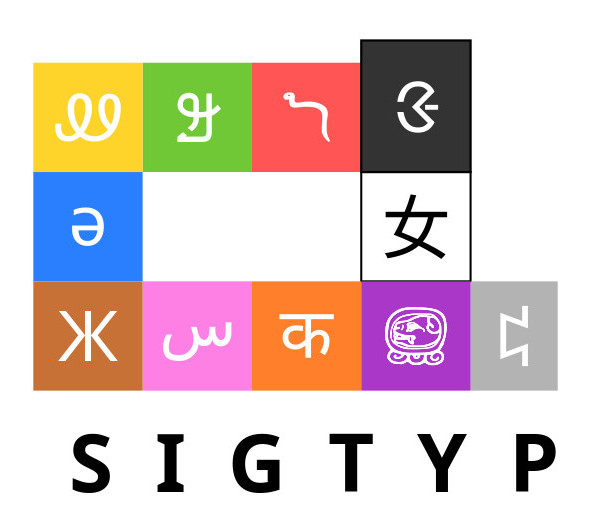Call For Papers
SIGTYP 2021: The 3rd Workshop on Research in Computational Typology and Multilingual NLP
To be held at NAACL 2021
Workshop description
The aim of the third edition of SIGTYP workshop is to act as a platform and a forum for the exchange of information between typology-related research, multilingual NLP, and other research areas that can lead to the development of truly multilingual NLP methods. The workshop is specifically aimed at raising awareness of linguistic typology and its potential in supporting and widening the global reach of multilingual NLP, as well as at introducing computational approaches to linguistic typology. It will foster research and discussion on open problems, not only within the active community working on cross- and multilingual NLP but also inviting input from leading researchers in linguistic typology.
SIGTYP workshop is the first dedicated venue for typology-related research and its integration in multilingual NLP. Appropriate topics include (but are not limited to) the following as they relate to the areas of the workshop: :
• Language-independence in training, architecture design, and hyperparameter tuning. Is it possible (and if yes, how) to unravel unknown biases that hinder the cross-lingual performance of NLP algorithms and to leverage the knowledge on such biases in NLP algorithms?
• Integration of typological features in language transfer and joint multilingual learning. In addition to established techniques such as “selective sharing”, are there alternative ways to encoding heterogeneous external knowledge in machine learning algorithms?
• New applications. The application of typology to currently uncharted territories, i.e. the use of typological information in NLP tasks where such information has not been investigated yet.
• Automatic inference of typological features. The pros and cons of existing techniques (e.g. heuristics derived from morphosyntactic annotation, propagation from features of other languages, supervised Bayesian and neural models) and discussion on emerging ones.
• Typology and interpretability. The use of typological knowledge for interpretation of hidden representations of multilingual neural models, multilingual data generation and selection, and typological annotation of texts.
• Improvement and completion of typological databases. Combining linguistic knowledge and automatic data-driven methods towards the joint goal of improving the knowledge on cross-linguistic variation and universals.
• Linguistic diversity and universals. Challenges of cross-lingual annotation. Which linguistic phenomena or categories should be considered universal? How should they be annotated?
Starting from 2021, the workshop will be dedicated to a shared theme, a central topic that most keynote talks and discussions will be focused on. In 2021, we would like to follow up a recent debate on linguistic diversity (p-linguistics, the study of individual languages) and universalism (g-linguistics, the study of Human Language), see Haspelmath (2020); Evans and Levinson (2009).
Important Dates (all deadlines are 23:59 AoE)
— Submission Deadline: March, 15 2021March, 29 2021
— Notification of Acceptance: April, 15 2021
— Camera-ready copy due from authors: April, 26 2021
— Workshop: June, 10 2021
Submissions
We invite both extended abstract submissions (non-archival) and general paper submissions (archival).
The accepted submissions will be presented at the workshop, providing new insights and ideas. Extended abstracts should describe already published work or work in progress and should not exceed two (2) pages. This way, we will not discourage researchers from preferring main conference proceedings, at the same time ensuring that interesting and thought-provoking research is presented at the workshop.
For general (archival) submissions we accept both long and short papers. Short papers should not exceed four (4) pages, long papers should not exceed eight (8) pages papers. Unlimited additional pages are allowed for the references section in all submission types.
Submissions should be anonymous, without authors or an acknowledgement section; self-citations should appear in third person.
Submissions should follow the NAACL-HLT 2021 style guidelines:
https://2021.naacl.org/calls/style-and-formatting/; both long and short paper submissions must follow the two-column format of ACL proceedings. All submissions must be in PDF format.
These should be submitted via softconf:
https://www.softconf.com/naacl2021/sigtyp2021/
